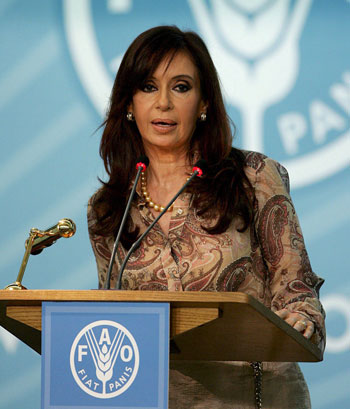Argentinian President Cristina Fernandez’s Victory Front coalition party suffered a tremendous loss in Sunday’s elections. Fernandez had hoped her party would win to a two-thirds majority in the congress, but now her party holds barely 50 percent of the seats.
Fernandez’s campaign began losing momentum a few weeks ago when she required immediate medical attention due to a blood clot found in her brain. In a rather clandestine turn of events, Fernandez underwent emergency surgery with a seemingly successful outcome.
This personal emergency, however, was just a smaller reflection of the greater sense of alarm surrounding her presidency.
The surgery may have removed the blood clot, but her month-longrecovery prevented her from campaigning for the mid-term legislative elections. Her party feared that without Fernandez’s dynamism in the campaign, it might not secure the two-thirds majority in the congress, keeping her from passing her political agenda.
Sunday’s elections proved their fears correct. The elections came at a critical, unfortunate time for Cristina Fernandez. Argentina faces growing economic problems, high inflation, and public disillusionment with the government and “Kirchnerismo” in general. Under Fernandez’s and her late husband’s leadership, Argentina has increasingly aligned itself with actors such as Venezuela and Iran and moved away from the United States and its traditional allies.
Fernandez characteristically likes to bypass the often slow decision-making process of democracies, in favor of authoritarian actions. For example, her administration showed its radical leftist underbelly in April 2012 when it expropriated the Spanish-owned oil company YPF-Repsol. Argentina has yet to offer compensation to the Spanish government for more than 10 percent of what it owes.
Like many other presidents in Latin American, Fernandez has inadvertently tried to subvert the separation of powers by overstretching her use of executive authority. She has been known to intimidate and bully independent judges who did not rule according to her preferences. Actions like these demonstrate her disdain for private property laws, separation of powers, and other important features of a liberal democracy.
Many suggested that, with the requisite two-thirds majority in congress that she hoped to get in these elections, she would attempt to pass a constitutional amendment enabling her to seek a third term. That said, with her party’s loss in the mid-term elections, she may be stuck in a lame duck presidency. Much to the relief of her opponents, she will not have the majority she needs to carry out her plans of extended presidential terms.
In the past, sickness has benefited her. When her husband suddenly died of a heart attack, her popularity soared, ending with her election to the presidency. However, this time, her record of mismanagement speaks for itself.
Sunday’s elections and Fernandez’s personal frailty have placed her party in a vulnerable place, with its popularity gradually declining. As for “Queen Cristina” as some opponents call her, her fairy tale may at last be coming to an end.
